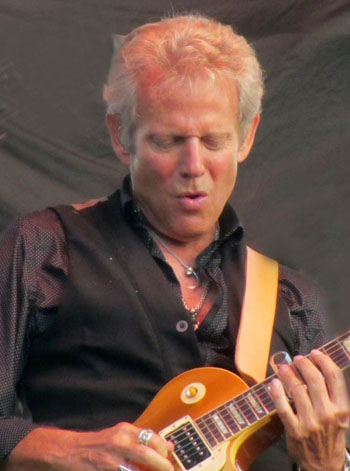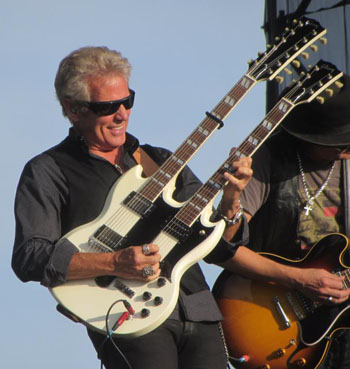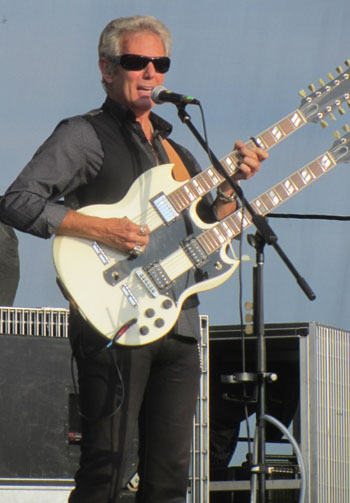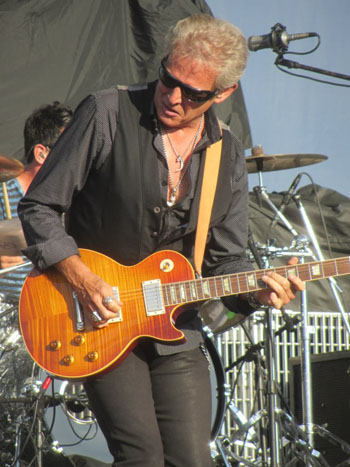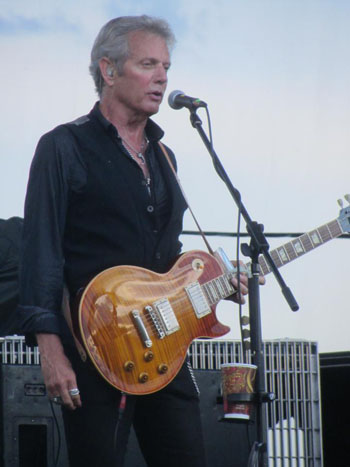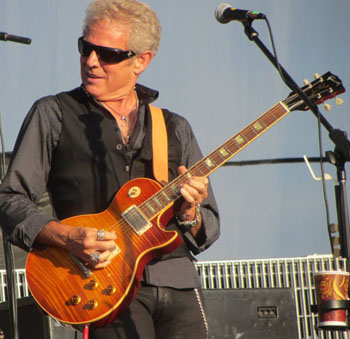
|
||
|
| Interview: DON FELDER | ||
Don Felder the former Eagles guitarist, Grammy Award winner,
Rock & Roll Hall of Fame inductee and best selling author
returns with 'Road To Forever', his first solo album for 30
years.
Don's signature guitar sound was an integral part of The Eagles
for 27 years. He helped cross the band over from country to LA
rock, co-wrote 'Hotel California' & through his work with Joe
Walsh, Bob Seger Stevie Nicks etc, became one of the most
influential guitarists of the time.
In 2008 he wrote the best selling book ''Hell: My Life in The
Eagles 1974-2001' and now comes the equally cathartic 'Road To
Forever' CD. It's an impressive album that parallels the book in
terms of its autobiographical lyrics while restating his LA rock
credentials.
Don Felder talks to Pete Feenstra about the new album, his time
with The Eagles and the song writing process.
So I would have to think about how Don Henley would sing for
example, or keep the music fairly simple, think about Tim's
dexterous bass playing, or Joe's particular guitar style etc. So
I ended up writing in a particular way to suit their style. This
album is much more of a liberating process for me and I'm
writing about myself for the most part.
In 2001 I had a difficult divorce and within the same year I left
The Eagles, so I lost part of my identity, from being a member
and guitarist of a well known band to being a husband.
The album is really about me finding myself again by going back
through those experiences and working through them. I think all
those experiences ultimately mould and shape us one way or
another.
Was the album a cathartic release for you, much like the book?
When I was on the road with The Eagles I practiced yoga in the
morning and used meditation to calm myself down. And while it
was a difficult to do when you were in a Holiday Inn with a
freeway right outside your door, it was still a good way to
start the day. So I used these techniques and they proved to be
very insightful.
...over the last eight or nine years especially, I
really missed playing live and so I wanted to start
writing songs that I could take out on the road and
play.
Initially we set our own pace, but Bernie Leadon left us as he
felt the pace of work was going beyond the boundaries of his
health – the sleep, touring, travel, studio, and writing cycle -
and eventually he wanted to take 2 to 3 months off.
It was his idea but when he suggested it to the band nobody else
wanted to stop, as when you are a hot act you tend to want to
keep going.
I'd known Bernie since high school and I dearly love the man. He's
brilliant musician and great song writer.
But going back to the gigs, over the last eight or nine years
especially, I really missed playing live and so I wanted to
start writing songs that I could take out on the road and play.
It's also about the way my mind changed and the journey from being
brought up by my mum's morals and going to church, to the 70's
era of drugs and promiscuity. It was all about how my life got
to that point. I did a lot of meditation and worked through a
lot of recollections.
Also Graham's son Jackson was like a big brother to my son Cody at
school. So 'Fall From the Grace of Love' was the kind of
serendipitous song I wanted to open the album with.
Did you have any kind of stockpile of songs to refer to when
making the album?
The new record really was a relief for me in being able to play,
write and pursue these ideas in their embryonic form.
My approach is much like the way I approached 'Hotel California'
which started out as a thumbnail sketch. Generally I would have
the idea, sort out the arrangement and the lyrics and then build
the structure and then record.
So I worked my way up to about 16 potential songs of which 12 were
used and the other 4 will be offered for free on downloads via
iTunes or my web site etc.
We started working on the record and leading into making the album
we would have these planning meetings and discuss what we were
going to do, who we thought should play on the record and how to
order the 16 songs etc.
Well Greg brought Robin in on one of those meetings. He's actually
the nephew of the legendary baseball player Joe diMaggio. Once
we had started, Greg went to Greece to see one of his artists
and he sadly passed away. And after talking about it for more
than a month Robin took over the co-production.
The song 'Road To Forever' is actually my salute to Greg. We
brought in everyone on the track who Greg had suggested should
play on the album.
We also talked about having a voice on the end of the song - a
sort of pool of sounds of everyone that has gone before us - and
you can hear Greg's voice at the very end when he says, 'The
difference between two worlds'
Among Robin's credits he's worked with Paul Simon and the end
of 'Heal Me' sounds like something Paul might have done himself?
So the song is talking about how we reach a place in life where
you can be healed. We originally had two songs and the end-piece
was called 'Healed', with the idea being after the damage you
can be healed. So we merged the two tracks together with the
positive uplifting African feel at the end.
It was a lullaby for our little boy when we were waiting for his
arrival. I wanted it to be a diverse record because the record
is about different parts of my life and that track is different.
Tommy Shaw from Styx helped me write it and he sang harmonies on
it. I was stuck on a couple of verses so we worked on them and
when we finished I said he had to sing on the chorus with me.
On 'Someday' I worked with Timothy Drury a brilliant keyboard
player who spent about 3 years in Whitesnake.
We sat down and wrote together. The compositional process
would be that he'd do the keyboard part and then I might add a
chorus and we'd end up with a piece of music. I'd add the
melody, go to the song's concept, sing it on the chorus and then
link it all together.
I'd do most of the vocals and finish the lyrics. So I would have a
demo with most of the lyrics, vocals, harmonies, and guitar,
before taking it into a studio to record with other musicians.
The next stage would be replace the drum track and then I'd bring
in say Chris Chaney on bass, Steve Lukather on guitar and David
Paich's keyboards. I would then work on the vocals and do the
backing vocals - or Timothy might sing - and so we'd move from
the ideas and the structures to the finished product.
I liken the process in terms of a New York artist I met between
1969 and 70. He had these huge canvasses that looked like a 17th
century painting of women talking to men, with birds in the
background. What was missing in the pictures was the hands. I
later found that he had these pictures of hands at the bottom of
the studio walls.
So I said to him why are there no hands in the picture? He told me
that the hands were most expressive part of the body, apart from
the eyes. So his way of working was to try and get the right
sort of emotion before adding them and I thought this was a
brilliant way of approaching song composition and musical
arrangements. So I adapted the same process for demos, where
you'd eventually master oil over the top of them.
Was the ballad 'I Believe' written with radio plays in mind?
Jermaine Jackson sang some oohs and aahs on the chorus and then
the melodies and harmonies. But The Jackson 5 never got to
record it and so I took the melody and concept and turned it
into a guitar driven piece.
And it's about a relationship when you are with a taker, a person
who is never really satisfied and always wants more. You get to
that point where you say I'm out of here, you don't have me.
It's the same with a band as it is with families. We did
try and hold it together, but when huge sums of money
become involved everything changes and you are not a
band anymore.
It's the same with a band as it is with families. We did try and
hold it together, but when huge sums of money become involved
everything changes and you are not a band anymore.
What happened in The Eagles was that you ended up playing
everything note for note. It was almost like being in a play and
it all became very sterile. It got to the point that even at the
sound checks no one would join in, they would just go there to
do their your parts.
It was the same in the studio, and when you don't have any
spontaneity or creativity it all quickly withers on the vine.
The nylon string guitar came in handy some years later when we did
the acoustic version of 'Hotel California' on 'Hell Freezes
Over'. Anyway, eventually I'd saved $1000 and got a U-Hail
rental truck and headed to the west coast.
There was a creative vacuum when I was in The Eagles so this solo
album is an opportunity for me to write my material, play it
live and make a connection with the audience.
Interview © September
2012 Pete Feenstra
Photos by Andy Nathan for GRTR!/Moondance 2012
|
|
get ready to rock is a division of hotdigitsnewmedia group

